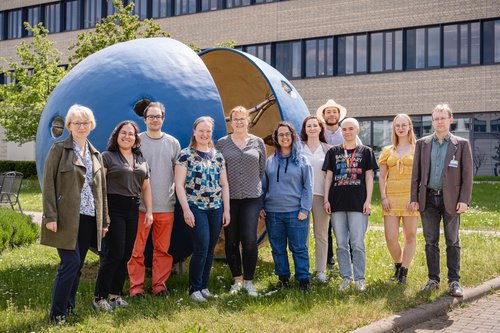Synapse-Brain-Cognition
Human thinking and feeling is individually very variable. Approximately 50 percent of this variability is probably genetically determined and is due in no small part to minimal differences in genetic information, so-called polymorphisms.
Our Imaging Genetics lab uses modern methods of functional imaging and experimental psychology to investigate the molecular mechanisms underlying human cognitive functions. We are particularly interested in the molecular components of excitatory brain synapses, whose main transmitter is glutamate, in their interaction with molecules of neuromodulatory transmitter systems, e.g. dopamine, adrenalin or serotonin. We work closely with the Human Genetics Department of the OVGU Magdeburg, the Institute for Molecular and Clinical Immunology, the Institute for Inflammation and Neurodegeneration, the DZNE Magdeburg and the Clinic for Psychiatry and Psychotherapy of the Charité Berlin and the University Hospital Göttingen.
- Heads
Heads
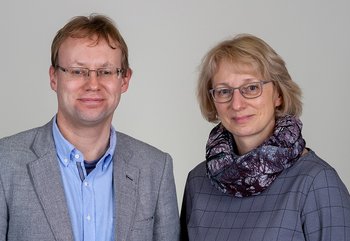
Björn Schott studied medicine in Kiel, Magdeburg and London from 1995 to 2002. In 2004 he completed his doctorate as Dr. med. and in 2008 as Dr. rer. nat. He is a specialist in psychiatry and psychotherapy and his research focuses on the extent to which genetic and immunological factors affect learning and memory processes in humans and their disturbance in old age and in neurological and psychiatric diseases.
Constanze Seidenbecher studied biochemistry at the Martin-Luther-University Halle from 1983 to 1988 and received her doctorate at the Otto-von-Guericke-University Magdeburg in 1996. In 2005, she was awarded the Venia legendi for Biochemistry at the Otto-von-Guericke University Medical Faculty, where she was appointed associate professor in 2015. From 2004 until 2022, she was responsible for the scientific organization and public relations at the LIN. - Members
Members
Heads Prof. Dr. Constanze Seidenbecher +49-391-6263-92051 constanze.seidenbecher@lin-magdeburg.de PD Dr. Dr. Björn Schott +49-391-6263-92051 bjoern.schott@lin-magdeburg.de Sekretary Carola Schulze +49-391-6263- 92311 carola.schulze@med.ovgu.de Postdocs Dr. Anni Richter +49-391-6263-93152 anni.richter@lin-magdeburg.de PhD students Margarita Darna +49-391-6263-92073 margarita.darna@lin-magdeburg.de Lukas Höhn (cand. med.) +49-391-6263-93341 André May (cand. med.) +49-391-6263-93341 Jana Schulze +49 391 6263 93341 jana.schulze@lin-magdeburg.de Technical staff members Steffi Bachmann +49-391-6263-92381 steffi.bachmann@lin-magdeburg.de Gusalija Behnisch +49-391-6263-93152 gusalija.behnisch@lin-magdeburg.de Kathrin Hartung +49-391-6263-93191 kathrin.hartung@lin-magdeburg.de Students Nadia Ay + 49-391-6263-93151 nadia.ay@lin-magdeburg.de Julia Bark julia.bark@lin-magdeburg.de Dimas Esteban Calderon Alfonso DimasEsteban.CalderonAlfonso@student.hs-anhalt.de Christia Darna christia.darna@lin-magdeburg.de Sophia Jauch + 49-391-6263-93151 sophia.jauch@lin-magdeburg.de Christian Laichinger Karla Reif karla.reif@lin-magdeburg.de Leonie Schenk leonie.schenk@lin-magdeburg.de Zoe Skärke + 49-391-6263-93341 Alumni Dr. Anne Assmann Larissa Fischer Hannah Feldhoff Wilhelm Hußler Lea Knopf Matthias Raschick Marc Roder Annika Schult Christopher Stolz - Projects
Projects
Extracellular matrix and cognitive flexibility
We want to investigate the importance of the extracellular matrix in the frontal cortex as a neural resource for cognitive flexibility and the potential transfer of this power from one task to another. In particular, we focus on the proteoglycans neurocan and brevican and the complex carbohydrate polysialic acid (PSA). In human subjects, we measure brain waves using EEG while solving tasks that require cognitive flexibility. Using functional magnetic resonance imaging, we determine the networks involved in the brain and model their interaction using "dynamic causal modelling".Synaptogenetics of human learning and memory
Synaptic plasticity mechanisms, which constitute the cellular basis of learning and memory processes, depend on a multitude of adapter and signaling proteins that are the core research subject of the Department of Neurochemistry and Molecular Biology. In our research group, we focus on the role of naturally occurring genetic variations of these proteins in human learning and memory (Barman et al., 2014; Schott et al., 2014)Dopaminergic modulation of implicit and explicit learning
Action and valence are commonly confounded in studies of motivated learning, but they are, in fact, not independent. For example, it is much harder to suppress an action in order to obtain a reward, than to avoid a punishment. We could demonstrate that the difficulty in learning the association of response suppression and reward is particularly pronounced in carriers of a gene variant of the dopamine D2 receptor (DRD2) that has previously been associated with risk for addiction (Richter et al., 2014; Samochowiec et al., 2014). Furthermore, gene variants associated with lower DRD2 expression could also be linked to individual variability of reward-related explicit memory formation (Richter et al., 2017).MemAgIn: Age-related memory decline and chronic inflammation
We are part of the research alliance “Autonomy in Old Age” funded by the State of Saxony-Anhalt and the European Union. In our project “Immune Factors and Aging”, we collaborate with the Institute of Molecular and Clinical Immunology (Prof. Dr. B. Schraven, Prof. Dr. D. Reinhold) in an interdisciplinary attempt to elucidate the effects of chronic subclinical inflammation on cognitive decline in the elderly. We have further established a collaboration with the Institute of Inflammation and Neurodegeneration (Prof. Dr. I. R. Dunay), in which we use Toxoplasma gondii as a model for inflammation-dependent synaptic pathology (Lang et al., 2018).COSEN-Co-Senescence of cognitive functions and immune mechanisms
We are part of the research alliance “Autonomy in Old Age” funded by the State of Saxony-Anhalt and the European Union. In our project antigen structure of peripheral blood mononuclear cells (PBMC), in particular human CD14+CD16+ monocytes, and the function of hippocampus-dependent memory in ageing and older healthy volunteers. We want to characterise this in the mouse model and record correlating factors of the subjects' microbiome.Midline brain structures and human long-term memory
Midline brain structures like the medial prefrontal cortex (mPFC) and the precuneus are considered core regions of the so-called Default Mode Network (DMN), which is typically more active during resting conditions (“mind wandering”) than during attention-demanding tasks. It is well known, that the DMN plays an important role in social cognition (Barman et al., 2015), and we could demonstrate that the information flow to the DMN during social cognitive tasks is primarily regulated via inhibitory processes (Soch et al., 2017). Recently, we could further identify a parietal midline region, the dorsal precuneus, as a key structure in spatial long-term memory formation (Schott et al., 2018).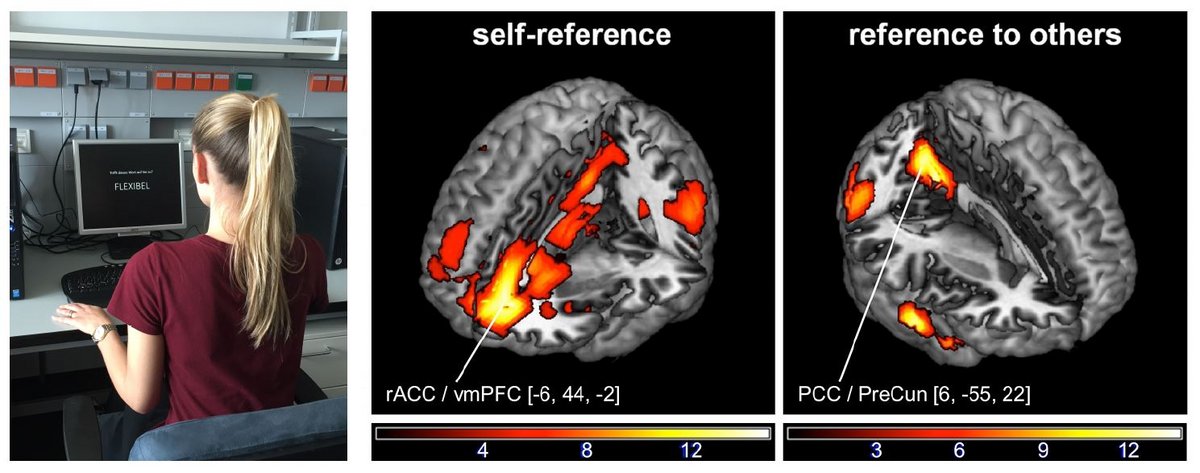
How do we think about ourselves and others? The midline structures of the brain are particularly active when examining thoughts about us and other people. - Selected Publications
Selected Publications
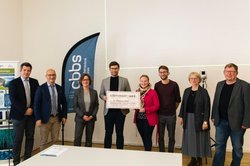
CBBS Paper of the Year 2020 Betts MJ, Richter A, de Boer L, Tegelbeckers J, Perosa V, Baumann V, Chowdhury R, Dolan RJ, Seidenbecher C, Schott BH, Düzel E, Guitart-Masip M, Krauel K. Learning in anticipation of reward and punishment: perspectives across the human lifespan. Neurobiol Aging. 2020 96:49-57. Epub 2020 Aug 22. PMID: 32937209. DOI: 10.1016/j.neurobiolaging.2020.08.011
Raschick M, Richter A, Fischer L, Knopf L, Schult A, Yakupov R, Behnisch G, Guttek K, Düzel E, Dunay IR, Seidenbecher CI, Schraven B, Reinhold D, Schott BH. Plasma concentrations of anti-inflammatory cytokine TGF-β are associated with hippocampal structure related to explicit memory performance in older adults. JNeural Transm (Vienna). 2023 Apr 28. Epub ahead of print. PMID: 37115329. DOI: 10.1007/s00702-023-02638-1
Kizilirmak JM, Soch J, Schütze H, Düzel E, Feldhoff H, Fischer L, Knopf L, Maass A, Raschick M, Schult A, Yakupov R, Richter A, Schott BH. The relationship between resting-state amplitude fluctuations and memory-related deactivations of the default mode network in young and older adults. Hum Brain Mapp. 2023 Jun 15;44(9):3586-3609. Epub 2023 Apr 13. PMID: 37051727; PMCID: PMC10203811. doi: 10.1002/hbm.26299
Richter A, Soch J, Kizilirmak JM, Fischer L, Schütze H, Assmann A, Behnisch G, Feldhoff H, Knopf L, Raschick M, Schult A, Seidenbecher CI, Yakupov R, Düzel E, Schott BH. Single-value scores of memory-related brain activity reflect dissociable neuropsychological and anatomical signatures of neurocognitive aging. Hum Brain Mapp. 2023 Jun 1;44(8):3283-3301. Epub 2023 Mar 27. PMID: 36972323; PMCID: PMC10171506. https://doi.org/10.1002/hbm.26281
Soch J, Richter A, Kizilirmak JM, Schütze H, Feldhoff H, Fischer L, Knopf L, Raschick M, Schult A, Düzel E, Schott BH. Structural and Functional MRI Data Differentially Predict Chronological Age and Behavioral Memory Performance. eNeuro. 2022 Nov 14;9(6):ENEURO.0212-22.2022. PMID: 36376083; PMCID: PMC9665883. https://doi.org/10.1523/ENEURO.0212-22.2022
Kizilirmak JM, Fischer L, Krause J, Soch J, Richter A, Schott BH. Learning by Insight-Like Sudden Comprehension as a Potential Strategy to Improve Memory Encoding in Older Adults. Front Aging Neurosci. 2021 Jun 14;13:661346. doi: 10.3389/fnagi.2021.661346. PMID: 34194316; PMCID: PMC8236646. https://doi.org/10.3389/fnagi.2021.661346
Soch J, Richter A, Schütze H, Kizilirmak JM, Assmann A, Behnisch G, Feldhoff H, Fischer L, Heil J, Knopf L, Merkel C, Raschick M, Schietke CJ, Schult A, Seidenbecher CI, Yakupov R, Ziegler G, Wiltfang J, Düzel E, Schott BH. A comprehensive score reflecting memory-related fMRI activations and deactivations as potential biomarker for neurocognitive aging. Hum Brain Mapp. 2021 Oct 1;42(14):4478-4496. doi: 10.1002/hbm.25559. Epub 2021 Jun 16. PMID: 34132437; PMCID: PMC8410542.
Assmann A, Richter A, Schütze H, Soch J, Barman A, Behnisch G, Knopf L, Raschick M, Schult A, Wüstenberg T, Behr J, Düzel E, Seidenbecher CI, Schott BH. Neurocan genome-wide psychiatric risk variant affects explicit memory performance and hippocampal function in healthy humans. Eur J Neurosci. 2021 Jun;53(12):3942-3959. Epub 2020 Jul 8. PMID: 32583466. DOI: 10.1111/ejn.14872
Schott BH, Wüstenberg T, Lücke E, Pohl IM, Richter A, Seidenbecher CI, Pollmann S, Kizilirmak JM, Richardson-Klavehn A. Gradual acquisition of visuospatial associative memory representations via the dorsal precuneus. Hum Brain Mapp. 2019 Apr 1;40(5):1554-1570. Epub 2018 Nov PMID: 30430687; PMCID: PMC6865719. DOI: 10.1002/hbm.24467
Kizilirmak JM, Schott BH, Thuerich H, Sweeney-Reed CM, Richter A, Folta-Schoofs K, Richardson-Klavehn A. Learning of novel semantic relationships via sudden comprehension is associated with a hippocampus-independent network. Conscious Cogn. 2019 69:113-132. Epub 2019 Feb 11. PMID: 30763808. DOI: 10.1016/j.concog.2019.01.005
Soch J, Richter A, Schütze H, Kizilirmak JM, Assmann A, Knopf L, Raschick M, Schult A, Maass A, Ziegler G, Richardson-Klavehn A, Düzel E, Schott BH. Bayesian model selection favors parametric over categorical fMRI subsequent memory models in young and older adults. Neuroimage. 2021 15;230:117820. Epub 2021 Jan 29. PMID: 33524573. https://doi.org/10.1016/j.neuroimage.2021.117820
Richter A, de Boer L, Guitart-Masip M, Behnisch G, Seidenbecher CI, Schott BH. Motivational learning biases are differentially modulated by genetic determinants of striatal and prefrontal dopamine function. J Neural Transm (Vienna). 2021 Nov;128(11):1705-1720. doi: 10.1007/s00702-021-02382-4. Epub 2021 Jul 24. Erratum in: J Neural Transm (Vienna). 2021 Aug 20;: PMID: 34302222; PMCID: PMC8536632. https://link.springer.com/article/10.1007/s00702-021-02382-4
Höhn L, Hußler W, Richter A, Smalla KH, Birkl-Toeglhofer AM, Birkl C, Vielhaber S, Leber SL, Gundelfinger ED, Haybaeck J, Schreiber S, Seidenbecher CI. Extracellular Matrix Changes in Subcellular Brain Fractions and Cerebrospinal Fluid of Alzheimer's Disease Patients. Int J Mol Sci. 2023 24(6):5532. PMID: 36982604; PMCID: PMC10058969. https://doi.org/10.3390/ijms24065532
- Current Third Party Funds
Current Third Party Funds
2020–2024
CRC 1436 „Neural Resources of Cognition”
Project A05: Extracellular matrix integrity as neural resource of cognitive flexibility
(with A. Dityatev, DZNE)
https://sfb1436.de/de/projekte/extracellular-matrix-integrity-as-neural-resource-of-cognitive-flexibility/2019–2027
DFG GRK SynAGE
www.synage.de2023–2025
BMBF Center for Intervention and Research on adaptive and maladaptive brain Circuits underlying mental health (CIRC)
Partner location
https://c-i-r-c.de/ - Internships
Internships
Our lab offers internships, master theses and medical doctoral theses for motivated and scientifically interested students. If you are interested, please contact Anni Richter at anni.richter(at)lin-magdeburg.de.
- Become a test person?
Become a test person?
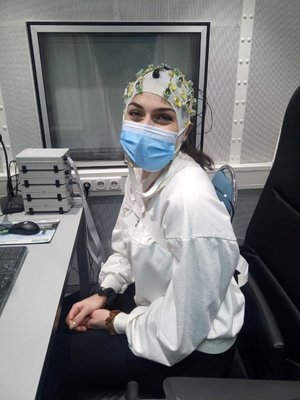
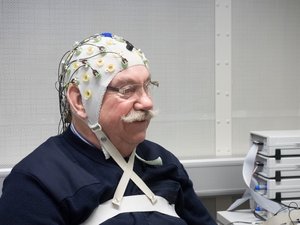
Probands wanted for studies
What is the study about?
The question is why some people are better at remembering things or react faster in certain situations than others. We are investigating what influence blood markers and gene variants have on these abilities.
Who can participate?
We are looking for healthy volunteers between 18 and 35 years of age and over 60 years of age without psychiatric, neurological or severe chronic diseases. Interested persons should be right-handed.
How can I register?
There are three ways to get in touch with us:- by e-mail at altersstudie(at)lin-magdeburg.de
- by answering machine at 0391-626392291 (please give your name, date of birth and contact details for a callback)
- via our online platform SONA - there you can find several studies that are currently being conducted in Magdeburg.
What does study participation involve?
Depending on the experiment, study participation may be structured differently, but in general we use the following methods:- Computer-based psychological tests
- Questionnaires
- Brain wave recording by electroencephalography (EEG)
- Magnetic resonance imaging (MRI)
- Taking a blood sample by qualified medical staff
When and where do the experiments take place?
By individual appointment at our premises at the Leibniz Institute of Neurobiology at Brenneckestraße 6 in Magdeburg.
What benefits do the test persons derive from the examination?
They receive feedback on the test results and can compare themselves with other peers. In addition, there is an expense allowance starting at 40 euros.


